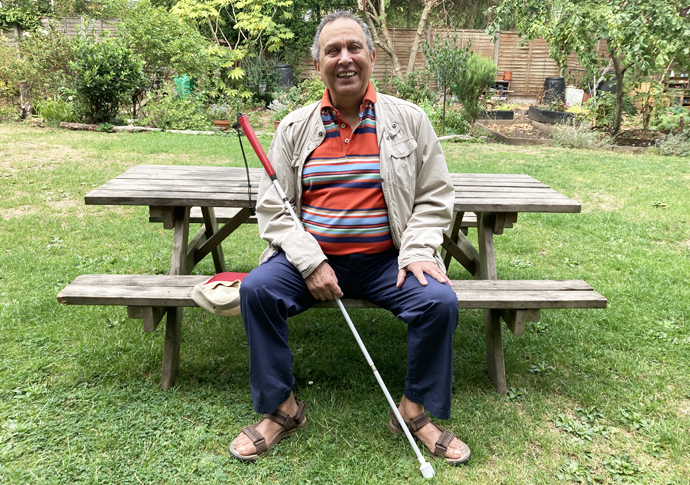
Former barrister says rampant foliage on pavement can obstruct and injure the sight-impaired
A BARRISTER who went blind in his 40s after taking a now-banned drug has called on others to stand up to inconsiderate neighbours who let their foliage run riot over the pavement.
Olav Ernstzen, 74, said residents who left their bushes and hedges to encroach onto the pavement were causing a hazard to blind people who tap the “inner shoreline” of the boundary walls with their sticks. This is a way of ensuring they do not wander into the roads.
Overhanging branches and spiky bushes can hit and scratch blind people in their faces, eyes and arms if they are not kept in order, he warned, and have led to him feeling “depressed” when he was not able to go out with confidence.
Mr Ernstzen has already tackled nearby neighbours who had let their bushes run wild, after being forced to get the council involved – but said he wanted publicity to ensure other blind people knew their rights.
He said: “They’re inconsiderate and it is a total obstruction to me and it discourages the use of the pavement and getting out and going places.”
It took two years of challenging the council to act before they finally moved on rogue neighbours. He has since received compensation for the delay. But he wants to take it further by calling on the council to be proactive by serving notice on residents who fail to take control of their bushes – and giving unresponsive landlords just 14 days to act.

Currently, sight-impaired people have to call the council with a complaint about a property and then the council engages with the residents in what can be a lengthy negotiation, under the remits of the Highways Act. Mr Ernstzen says the council has a duty to sight-impaired people to make highways hazard-free, under the Equality Act 2010.
He added: “As the obstruction prevents me from using the pavement in the same way as others it is classified as disability discrimination, and the council has a statutory duty to remove all discrimination.”
In 1994, Mr Ernstzen was working as a criminal barrister when he began to have problems with his vision. He visited a hospital and was given drops to assist him, but tragically the side effects left him blind. They were immediately taken off the market. He said he had never pursued compensation because the side effect he experienced was unknown, and to his knowledge never occurred to anyone else.
Describing that experience, he said: “It’s not so much anger as a source of distress, a sense of loss – what I can’t do, because I can’t see. I used to drive a lot. I drove all the way to India some years ago. And I was also learning to fly, both light aircraft and helicopters. Those little things obviously I can’t do. And so I’m going to compensate and I suspect one of the ways I compensate is trying to make sure that other people aren’t faced with barriers.”
He also had to leave law and went on to work in transport steering groups.
But he said being blind has given him one surprising benefit: “So often people make judgments about others by what they look like. I only make judgments about people about who they are. And that’s actually quite liberating.”
An Islington Council spokesperson said: “Islington Council is committed to ensuring that its pavements are accessible for all, especially those with disabilities and mobility issues.
“Hedges, foliage, and trees support biodiversity and help improve our environment, but if a hedge or foliage is causing an obstruction, we will contact the property owner and ask them to cut it back.
“We regularly inspect our footways and pavements for trip hazards, and if residents give us details of specific areas of concern we will look into them.
“We apologise again to Olav Ernstzen for the delay in addressing the pavement obstruction near his property, which was caused by overgrown bushes.
“We’re pleased that the matter has now been resolved to Mr Ernstzen’s satisfaction, and have compensated him a total of £225 for the delay in responding to his complaint and addressing the issue.”

Comments